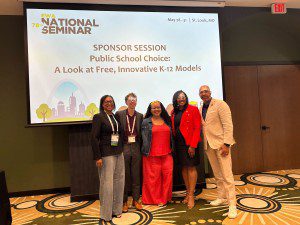News and Insights
9 Takeaways from the 2025 Education Writers Association National Seminar
June 6, 2025
What We’re Really Up Against
As relatively new members of FINN’s Global Education practice, we were thrilled to get a chance to attend the Education Writers Association (EWA) National Seminar in St. Louis in late May. EWA is made up of 3,000 journalists, researchers, teachers, policymakers, and others dedicated to improving the quality and quantity of education reporting. FINN has long supported EWA–Scott Widmeyer, one of our founding managing partners, was a member of the EWA board for years. The experience was both informative and affirming.
The three-day conference was filled with sessions on the issues we cover for our clients every day. Everything from early childhood to post-secondary education—including literacy for all, math inequities, school choice, post-secondary pathways, and the ongoing news surrounding higher education. The conference also provided us with inside access to journalists as they shared insights on their respective beats and their preferences for how to work with PR professionals.

The main takeaway: Journalists need our support. Every reporter we encountered was feeling the burnout—they’re overwhelmed and fatigued by everything from the punishing pace of the current news cycle to shrinking budgets and newsrooms. Despite this, they were all deeply committed to the important work they do. We found their dedication inspiring, and resolved to double down on all the ways we can be the kind of PR pros that reporters trust and rely on. How? Here are nine takeaways from Education Writers Association sessions and our conversations with reporters that we intend to commit to:
1. Be a Strategic Partner. Through our clients we can connect journalists to credible sources, clarify complex data, and be more proactive than reactive in offering context and shaping messaging that is both transparent and timely.
2. Spotlight Real People. Journalists are committed to elevating underrepresented voices and avoiding generic statements. This means we need to highlight real people in our pitches, people whose stories illustrate the impact and success of our clients.
3. Lean into Data. Data was top of mind at this year’s seminar. No matter the topic, every panelist stressed the importance of using data in education reporting. We need to leverage the data our clients give us and translate it into accessible, human-centered narratives.
4. Be a Helper. Education reporters are struggling with shrinking newsrooms and growing story loads. We can help make their jobs easier by providing clear, press-ready materials and fast access to subject matter experts.
5. Relevance is everything. Make sure pitches are tightly tied to the reporter’s beat, current news or policy decisions. Avoid generic themes, anniversaries or awareness months; these hooks only work if paired with something new like data, legislation, or court decisions.
6. Email is king. Communicate concisely. Reporters are pressed for time; keep outreach short, specific and respectful. Be clear about availability (not just “next week”) and avoid following up across multiple platforms (they find it invasive).
7. Lead with urgency, impact and a news hook. Here’s the “Holy Trinity” for evaluating pitches:
- Urgency: Why now?
- Impact: Who is affected?
- News hook: What makes this news?
8. Show, don’t tell—and offer access. Reporters want to get out of the office. Invite them into classrooms, connect them with front-line educators and offer vivid, ground-level material they can’t find elsewhere. (But also understand that their budgets and bandwidths are tight.)
9. Reframe the narrative. Whether it’s math trauma, early childhood education or systemic inequality, don’t just inform, reframe. Highlight resilience, elevate voices doing the work and center the deeper societal story.
The Education Writers Association National Seminar didn’t just bring together journalists, researchers, and PR professionals, it threw attendees into the thick of what education reporting looks like right now.
Putting faces to the names in our spreadsheets was a great reminder of the delicate dance between journalists and PR professionals. Creating and maintaining relationships with journalists that are rooted in trust is more important than ever. These are not transactional relationships, where we blindly blast emails to reporters in the void, but ones built on respect and transparency. Now, more than ever, we need to support each other in order to tell compelling stories that can inform, shift perspectives, and uplift the voices of educators and families.
It feels like the work of education journalists has never been more challenging, or more important. We’re ready to help.
